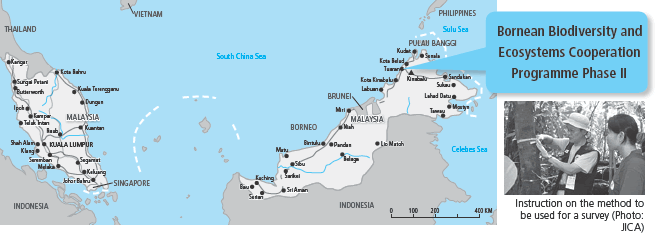Japan's Official Development Assistance White Paper 2009
Box 1 Japan's Assistance in the Area of Natural Environment Conservation
— For the 2010 International Year of Biodiversity (IYB) —
There are over 30 million species on this planet. Humankind is a member of the enormous ecosystem comprised of such diverse species, and receives great benefits from the ecosystem. However, because of human activities, the ecosystem continues to deteriorate and the number of species living on the planet is in decline. According to the United Nations Millennium Ecosystem Assessment announced in 2005, benefits from the ecosystem are expected to notably decrease in the first half of this century.
The international framework on biodiversity conservation and its sustainable use, the Convention on Biological Diversity (CBD), was adopted in May 1992 to promote efforts to fight against this problem. This Convention was opened for signature at the United Nations Conference on Environment and Development (UNCED, Earth Summit) held in Rio de Janeiro, Brazil in June of the same year, and then entered into force in December 1993 (it has been concluded by 190 countries and the European Community (EC) as of September 2009). The year 2010 has been declared as the International Year of Biodiversity, so many events related to biodiversity conservation are expected to be organized around the world. In Japan, the 10th Meeting of the Conference of the Parties to the Convention on Biological Diversity (COP10) will be held in Nagoya City, Aichi Prefecture in October 2010.
Japan announced the Environmental Conservation Initiative for Sustainable Development (EcoISD) in 2002, which positioned natural environment conservation as one of the priority areas for environmental cooperation conducted mainly through Official Development Assistance (ODA). Moreover, the Medium-Term Policy on Official Development Assistance of Japan formulated in 2005 has set natural environment conservation, including the conservation and management of natural reserves and forests, among others, as one of its priority issues. Based on these, Japan is extending its assistance for the conservation and sustainable use of biodiversity in developing countries through the provision of ODA. Among such ODA projects that Japan has implemented are the "Capacity Enhancement Project for Coral Reef Monitoring" in the Republic of Palau and the Bornean Biodiversity and Ecosystems Cooperation Programme in Malaysia. Outlined below is the programme carried out in Malaysia.
The State of Sabah in Malaysia, is known to the world for its diverse ecosystem, but its tropical rainforests are rapidly decreasing due to logging and plantation development. In addition, due to the limitation of the total area of reserves in the country, the number of endangered species is increasing in recent years. As such, Japan conducted the Bornean Biodiversity and Ecosystems Cooperation Programme Phase I between February 2002 and January 2007. Specifically, working together with the Government of the State of Sabah and Sabah University of Malaysia, Japan implemented activities to sustainably conserve the precious biodiversity and ecosystems of Borneo by organically combining the following four areas: research and education, management of state parks, management of wildlife habitats, and environmental awareness. Phase II, which is currently being implemented, aims to establish and enhance the system of biodiversity and ecosystem conservation as an administrative system of Sabah based on the results obtained from the conservation activities conducted in Phase I.
At the COP10, the targets after 2010 (Post 2010 Biodiversity Targets) are to be determined. Of the measures for after 2010 discussed within the debate, priority issues are not only those directly related to nature conservation, such as the protection of rare species and management of protected areas, but also a wide range of measures to conserve biodiversity, such as the realization of sustainable production in the activities of agriculture, forestry, fisheries and other industries, and creation of habitat areas maintaining social capital, among others. Furthermore, in light of the trend to make biodiversity a mainstream issue, it is considered necessary to provide development assistance in various areas taking biodiversity into consideration. Japan, which will host COP10, is expected to take on further leadership in the area of natural environment conservation, and carry out various development assistance measures taking biodiversity into consideration.

